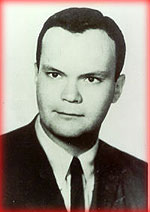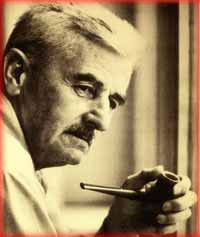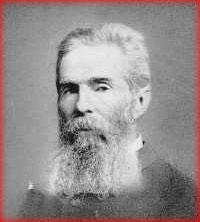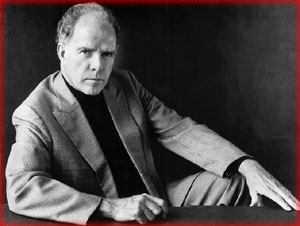
|
||
| Volume II, Issue IV | Winter 2003 | |
| Winter 2003 Home Page |
| Culture/ Technology |
| Fiction |
| Music |
| Poetry |
| Theater |
| About / Contact |
| Archive |
| Current Home Page |
What I would tell my student writers
 John Kennedy Toole |
There is a story about a writer who had great talent, but not enough resilience. One day this writer decided that he couldn't take rejection any more and so he killed himself. The writer's name was John Kennedy Toole, and he had a brilliant manuscript that no one would publish. For years and years his book was rejected, and finally in despair he gave up and went the way of those who just can't take it anymore. Luckily for us, Toole had a mother who believed in him, and she continued to send his worn manuscript around. Rejections piled up for six more years. Then in 1976 the novelist Walker Percy read Toole's much traveled book and realized it was, "A great rumbling farce of Falstaffian dimensions." Percy sent it to Grove Press with a recommendation that they publish it. Grove Press did publish it, and in 1980 Toole's book, "A Confederacy of Dunces," won rave reviews and the Pulitzer Prize. Walker Percy wrote: "The tragedy of the book is the tragedy of the author, his suicide in 1969 at the age of thirty-two. Another tragedy is the body of work we have been denied."
It is a pity that Toole didn't stick around to collect his prize and to go on writing more novels. But he didn't. And we are the poorer for it. The writing world is abundant with stories like Toole's – writers killing themselves in one way or another, either physically or psychologically, writers giving up and considering themselves to be failures because they can't get a publisher; or they do get published and find out it was not a dream come true after all. They are still ignored. Nothing has really changed. They still have to battle to get their next work printed, and their next, and their next. Finally, for many of them, it is just too much. So off they go to drive trucks, or become teachers, or janitors, or used car salesmen. Who knows? The point is, they give up on themselves as writers, and some probably should, but certainly not all.
 William Faulkner |
A good editor like Perkins is a god-send to an author, but there aren't many out there in publishing-land. They are all overworked and some are burned out. And there is too much pressure on them to buy books that increase profits rather than prestige. Editors don't have time to work with or develop an author. It is not their fault; it is just the way the business is. The hell with this art stuff, you know, this "literature" that writers want to write. Keep them cranking out fast-read, commercially lucrative pabulum for the masses. Watch television sit-coms, then go write something similar. I mean, do writers really think that the American mind has time or inclination to work on intellectual enlightenment or the nourishment of its soul? How precious. How naive. How pitiful. How "Russian."
 Herman Melville |
Publishing's profit margins force it to reject the innovative or the artistic, and writers must know by now that if they insist on being a writer dedicated to the notion that writing is an art, they are going to be rejected. They are going to feel awful about themselves. Their confidence will dwindle. They are going to get depressed, maybe even suicidal. But if they are the kind of writer who needs to write, the kind that would write even if they didn't get published, and the kind of writer who realizes that the writing life is a path not a place, and it often leads him or her through dark woods where the straight way is lost and then found because of the writer's own stubborn efforts, remorseless labor and resilience. If you are that kind of writer, then the odds will narrow in your favor and your chances for success will be vastly increased. It is an axiom that those who get published are those who refuse to quit no matter how devastating rejection is. They stay with their craft day after day and perfect it and make it impossible to resist. But they are up against that "vision thing," the lack of it that many publishers have, and writers have got to be bloody stubborn to go on. They have got to have a mean streak in them that refuses to take no for an answer. They have got to hang onto their belief in themselves, and believe that they will overcome.
 William Kennedy |
So what I've got to tell my writing students is – brood if you must, but get over it and get back to work. It is the only way to overcome the odds that are stacked against you. And really, what else would you rather do than write? What else is more important to you? What would give your life more meaning? Ultimately, when it is time to close the final chapter of your life, what else would you rather have done than spend it as a writer? You may be the writer who can make us hear, feel, see, touch, smell, taste the totality of our being better than any writer who has ever lived. You may be the one to realize Conrad's task of awakening "in the hearts of the beholders that feeling of ... solidarity in mysterious origin, in toil, in joy, in hope, in uncertain fate, which binds men to each other and all mankind to the visible world."
That, in part, is what fine writing tries to do, and that is what so few of those who publish books can see – that physical, intellectual and spiritual ties which bind are also the ties which fine writing strives to reveal. And that these revelations would help us toward the creation of a better world, a more elevated, more insightful and more admirable world, one which understood itself better because it appreciated the best writing, the most intelligent writing, the most profound and insightful writing our authors were capable of producing. The power of the written word can change people's lives forever and that is why it is so important that we are given the best selection possible to read.
We live in a time of fear and wonder, despair and hope – fear of the oppressive power of our economic condition and the barbaric capabilities of our fellow human beings, and wonder at what has been accomplished by the human mind; despair at the violent country we have created and hope that there is a way out of the mind-boggling complications of modern civilization, a path to some oasis, some more rational, peaceful side. Writers, not just of literature, but all writers, have an obligation to put this world into perspective for us, to tell us about the meaning of it all, to expose the world as it is, the realities of a staged and insolent political power, and human impotence in the face of that power, impotent as long as we respond to power's gimmickry, its silly flag-waving symbolism, its five-second sound bites of the day, its abstracted points of light, its lack of depth in confronting the great questions of the future of our country, of education, or the environment, or the homeless, the hungry, the sick, and the unemployable. Where are we going? Where have we been? Why do we suffer? Writers have traditionally confronted these issues and given us insight into them. "Books are where things are explained to you, life is where they aren't," some writer once said. It is true, nothing explains what life is and what it means to be a part of it better than a good book.
And if those of you who create the books would only understand that you are part of a noble and necessary calling, which in the most profound and potent ways continually rescues this world from barbarism, then you might somehow find the resilience needed to go on, despite the devastating rejection which comes with the territory. Jerry Bumpus, King of the Underground Writers (according to novelist Vance Bourjaily), once gave me some advice about coping with the system. With affection and respect, I pass that advice on to you, student writer – "Don't let the bastards wear you down."
![]()
Winter 2003 Culture, Politics & Technology Section | Winter 2003 Main Page
Current Culture, Politics & Technology Section | Current Home Page
Copyright ©
Reprinted by permission of author, who retains all copyright and control.